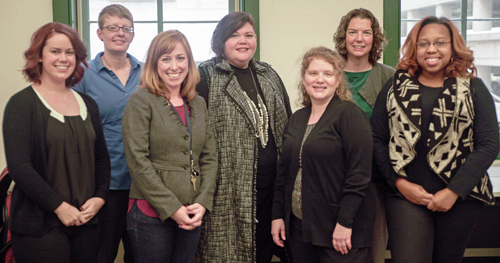LGBTQ Youth in Foster Care Focus of SSW Institute Grant Award
The Institute for Innovation and Implementation at the University of Maryland School of Social Work (SSW) has been awarded a five-year, $10 million grant to assist lesbian, gay, bisexual, transgender and questioning (LGBTQ) children and young adults in foster care.
The grant, recently awarded by the U.S. Department of Health and Human Services, Administration for Children and Families’ Children's Bureau, will allow the institute and participating partners to establish a National Quality Improvement Center (QIC) on Tailored Services, Placement Stability and Permanency for LGBTQ children in foster care.
The intent of the project is to work with four to six sites nationally, in partnership with state child welfare systems, to implement promising and evidence-based practices that improve placement stability, well-being, and permanency. These sites will be identified as part of the LGBTQ QIC process. These interventions will be designed to enhance staff, caregiver, and provider knowledge, skills, and competency in providing safe, affirming, and supportive environments for LGBTQ youth in foster care.

From left, Rachel Beaudry, Sara Betsinger, Jill Farrell, Marlene Matarese, Elizabeth Greeno, Bethany Lee, and Whitney Burton.
Marlene Matarese, PhD, MSW, principal investigator, and clinical assistant professor and director of training and technical assistance, expressed gratitude to the Children’s Bureau for “continuing to prioritize the needs of LGBTQ children and youth.”
“We have seen too many youth who identify as LGBTQ in the child welfare system without a plan for permanency, connections to people who unconditionally care about them, or supports that are designed to be responsive to their unique needs,” she said. “I’m thrilled to have the opportunity to be part of changing this trajectory and fostering a culturally responsive workforce, and evidence-based services and supports for LGBTQ youth in foster care.”
LGBTQ children in foster care face a unique set of challenges including harassment by peers in child welfare settings, discomfort or rejection among foster parents and agency staff, and a lack of services to meet their specific needs. There is a notable cycle of system involvement and lack of permanency for youth who leave or are removed from their family home as a result of maltreatment related to their sexual orientation and gender identity.
“This opportunity to deepen our capacity to assist sexual and gender minority youth involved with child welfare services offers enormous possibilities,” said SSW Dean Richard P. Barth, PhD, MSW. “I am very proud to have the leadership in Marlene Matarese and amazing partners who will realize every bit of this opportunity to help transform the way child welfare works.”
Among the SSW faculty and staff members who will contribute to the LGBTQ QIC along with Matarese, are: Elizabeth Greeno, PhD, MSW, associate research professor, who will be the lead evaluator; Jill Farrell, PhD, MA, research assistant professor; Sara Betsinger, PhD, MA, research assistant professor; Rachel Beaudry, MSW, program specialist; LGBTQ CIC grant coordinator Whitney Burton, MSW, MPH, CPH; and senior advisors Bethany Lee, PhD, MSW, associate dean for research and associate professor, and Nancy Dickinson, PhD, MSSW, clinical professor.
Also participating as core partners in the LGBTQ QIC are national experts including: Christopher Bellonci, MD (Tufts University); Johanna Bergan, and Brianne Masselli (Youth Motivating Others Through Voices of Experience National); Terry Cross, PhD, and Puneet Sahota, MD (National Indian Child Welfare Association); Kathy Lazear, MA, and Sheila Pires, MPA (Human Services Collaborative); and Gerald Peterson, MA, and Jessie FullenKamp, LMSW (Ruth Ellis Center).
“I am excited and honored for the institute to host the Quality Improvement Center,” said Michelle Zabel, MSS, assistant dean and director of the Institute for Innovation and Implementation. “I know the work of this center will impact children and youth in our child welfare systems and I look forward to changes in practice and policy that will happen because of this work,”
The University of Maryland is home to the Graduate School and schools of dentistry, law, medicine, nursing, pharmacy, and social work and it is the founding campus of the University System of Maryland.
The Institute serves as a national training, technical assistance, evaluation, policy, systems design, and financial center that is focused on children's behavioral health. The Institute supports state and local governments and organizations to implement effective systems and practices to best meet the needs of children and youth with complex behavioral needs and their families.



